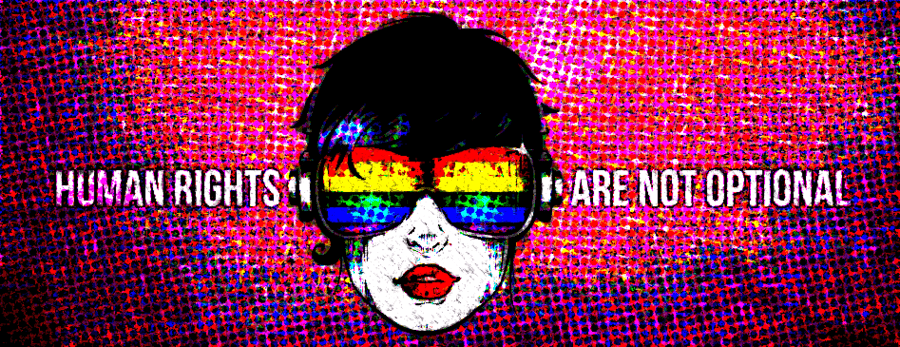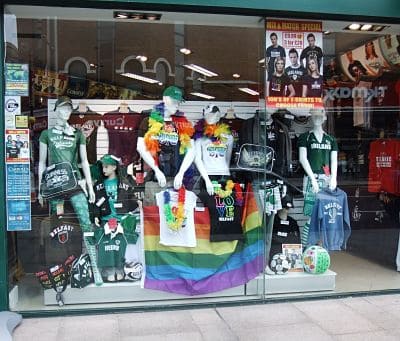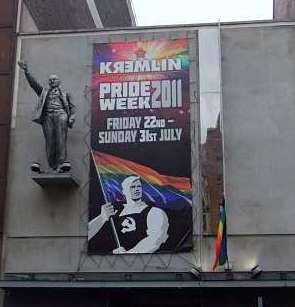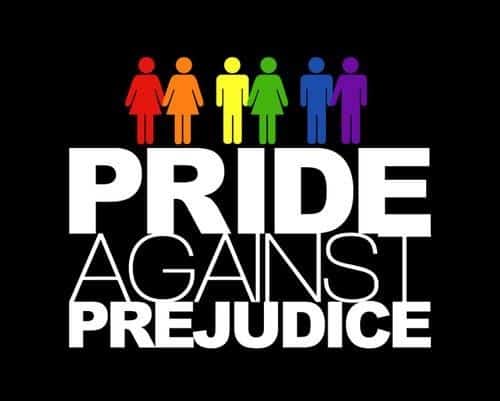In the summer of 2008, Iris Robinson had a lot to say about homosexuality. On 6 June, in a radio interview, the Northern Ireland MP urged gay people to seek reparative therapy. On the 17th, in the House of Commons, she declared that ‘There can be no viler act, apart from homosexuality and sodomy, than sexually abusing innocent children.’ On the 30th, in the Northern Ireland Assembly, she called homosexuality an ‘abomination.’ In a follow-up radio interview in July, she rounded out her comments by explaining a ‘government responsibility to uphold God’s law’ — referring to a Biblical death penalty, presumably for cases of irreparable homosexuality. LGBT advocates objected to Robinson’s views with swift and savvy political tactics.
Robinson’s comments generated intense media coverage, partly because of her political office and her status as wife Northern Ireland’s First Minister. Public outrage at her comments marked a turning point of sorts for LGBT advocacy. The local Pride Festival and other organizations solicited condemnations of the comments from political parties, trade unions, and religious leaders—and enlisted their support for the upcoming Pride Festival. The city’s annual Pride Festival doubled in size, and many local leaders began to publicly support LGBT rights. Subsequently, LGBT advocates nurtured these newfound alliances and galvanized broader public support for the cause of LGBT equality.
Media coverage of Robinson’s comments and subsequent scandals surrounding her personal life often obscure the response of LGBT advocates, and the longer history of LGBT activism in Northern Ireland. Considered within this historical context, the Robinson incident reveals broader challenges to how we think about human rights in post-conflict politics, and human rights advocacy generally.
As an anthropologist, I have studied grassroots rights politics through fieldwork and archival research in Belfast since 1997. Over these years, the peace process unfolded fitfully, and the settlement often seemed less transformative than proponents claimed. At the same time, debates about LGBT rights created political possibilities that are dramatically different than the post-conflict divisions of unionism and nationalism.
The lesson of Robinson’s ‘summer of love’ is not that Northern Ireland is a parochial backwater run by bigots, although political conflict since the 1960s has made the region an exotic oddity in public imagination. Actually, the first international court decision on sexual orientation and human rights originated in Northern Ireland. In 1981, the European Court of Human Rights upheld Jeff Dudgeon’s challenge to Northern Ireland’s sodomy law (Dudgeon v. U.K.). Set against this long history of legal mobilization, conflicts about Robinson’s rhetoric are potent reminders that advocates must embed human rights principles in social life.
Like other queer rights movements, LGBT activism in Belfast traces its origins to Stonewall and liberation movements of the late 1960s. Since then, local advocates continued to pursue LGBT equality, although the cause was often marginalized by the violent civil conflict. In the 1970s, local advocates lobbied for law reform. Political leaders, particularly from Robinson’s party, the DUP, resisted. Indeed, Robinson’s language in 2008 echoed the rhetoric of 1970s reform opponents, whose ‘Save Ulster from Sodomy’ campaign was led by her party’s former leader, Reverend Ian Paisley (Democratic Unionist Party).
In 2008, public reception of this rhetoric was dramatically different from those days when campaigners claimed 70,000 signatures against law reform. Local politicians and civil society groups publicly distanced themselves from her views.
These rejections of anti-gay politics and rhetoric were not the product of inevitable social progress. Rather, public support for LGBT equality emerged from campaigns for legal changes, pragmatic policies, and public understanding.
Legal equality for LGBT people in Northern Ireland is an understudied consequence of the 1998 peace settlement, the Good Friday Agreement (GFA). The multi-party peace talks foregrounded human rights considerations, and the GFA’s provisions add sexual orientation to a list of safeguarded categories, alongside religion, race, gender etc. Even before the settlement was finalized, gay activists were acutely aware this change was imminent, and began planning campaigns for legal equality.
Legal equality was not automatically triggered, and a wide range of supporting legislation was necessary. However, the devolved assembly functioned only intermittently during its first decade, and necessary legal changes were implemented from Westminster or by civil servants. Conscious of this dynamic, local LGBT activists directly lobbied MPs from Britain and state agencies for legal reforms, such as the Sexual Offences (Amendment) Act 2000, Civil Partnership Act 2004, Criminal Justice (No 2) (Northern Ireland) Act 2004, Equality Act (Sexual Orientation) Regulations (NI) 2006, and Sexual Offences (Northern Ireland) Order 2008.
Since the agreement, the social context of queer life in Northern Ireland has changed even more dramatically than the legal environment. The louche haunts and alleys of Belfast’s Cathedral Quarter have been redeveloped and rebranded.
Pubs, cafés, and shops now vie for the “pink pound” and assert their “gay-friendliness.” The revitalized city center contrasts sharply to the desolate 1970s, when a “ring of steel” was erected, and gay and deaf people, prostitutes and punks, surreptitiously created subcultures in Belfast’s militarized nightscape.
The annual summer array of rainbow flags contrasts with even the 1990s, when the peace process was in its infancy, and the city boasted only one gay bar, perched furtively by the docks.
Increased recognition and acceptance of LGBT people also contrasts with the continuing ethnopolitical antipathies. For example, since the 1990s, Orange parades have caused intense rioting and annually reminded the world of the region’s longstanding divisions. Political polarization has intensified. Parades, symbols, and past violence remain contentious, intimating, for some, a return to conflict. In the past year unionists staged protests to restore the Union Jack over City Hall, and republicans protested the arrest and questioning of Sinn Féin president, Gerry Adams.
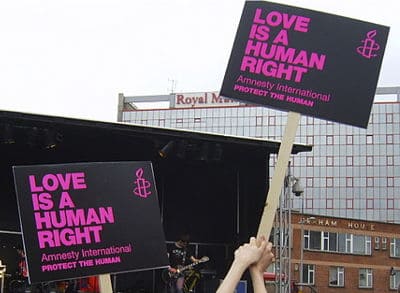 Against this continuity of conflict, Belfast’s annual summer Pride
Against this continuity of conflict, Belfast’s annual summer Pride
Festival asserts a new and different kind of reconciliation. Belfast Pride is the largest pride event in Ireland and is the largest cross-communal organization in the region. The festival is much more than a parade. It includes a weeklong schedule of dozens of events, including public debates, film screenings, plays, exhibitions, cabarets, and church services.
The emergence of LGBT rights activism at the end of the twentieth century was part of the global expansion of human rights advocacy and law. Since then, both critics and advocates of human rights have begun to question the “proliferation” or politicization of human rights.
Today, we are rightly suspicious when human rights talk justifies wars and other wrongs. However, warnings about “third generation” or “invented” rights also discredit the claims of groups who only recently gained access to the promises of human rights.
So in practice, attempts to restrict human rights claims in legal and rhetorical terms also restrict access to both legal authority and rhetorical power.
Despite sobering evidence of the ongoing insecurity and inequality faced by LGBT people in Northern Ireland, events in 2008 are part of a larger story of gradual change. The story of LGBT organizing in Northern Ireland is a potent reminder of links between fundamental human rights to assembly, association, and speech, and practices that embed equality and create safety for vulnerable people. LGBT activists have pursued concrete legal changes and real social reconciliations—within trade unions and schools, between churches and gay parishioners, state agencies and gay citizens, and even, at times, advocates and opponents of gay rights.
These rapprochements are not based on claims for new rights or exclusive communalized rights; they emerge from an inclusive understanding of human life, experience, and value. This history shows how changes in law and society are interdependent, and that human rights advocacy is central to mutually reinforcing legal and social practices.

